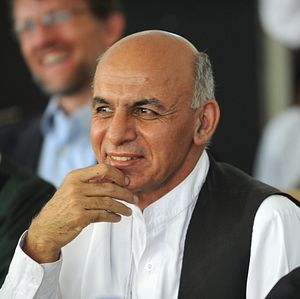This week, Afghanistan’s President Ashraf Ghani and Pakistan’s Prime Minister Nawaz Sharif pledged to deepen cooperation on defense and security issues during a bilateral meeting that took place in Kabul.
Ever since his inauguration in September 2014, Ashraf Ghani has worked hard to improve relations with Pakistan. It was his initiative to invite a senior-level Pakistani delegation to Kabul that, aside from Prime Minister Nawaz Sharif, included Pakistan’s Chief of Army Staff Gen. Raheel Sharif and Lt. Gen. Rizwan Akhtar, the director-general of Inter-Services Intelligence (ISI).
The main topic of discussion was the possibility of joint operations against Taliban insurgents and deeper cooperation in combatting regional terrorism. Pakistan’s Prime Minister was at pains to emphasize that both countries are fighting the same enemy. “I assure you, Mr President, that the enemies of Afghanistan cannot be friends of Pakistan,” he told reporters during a press conference in Kabul, according to The Guardian. “Any effort by any militant or group to destabilise Afghanistan will be dealt with severely and such elements will be outlawed and hunted down.”
Additionally he noted that, “[c]oordinated operations will be planned and conducted on a mutually agreed basis to target militant hideouts along the border.” This, he said, underlines “Pakistan’s resolve to further deepen our defense and security partnership with Afghanistan through enhanced cooperation along the border and human resource development.”
Over the last couple of months, Ashraf Ghani, has repeatedly signaled Islamabad that he is willing to cut ties with Pakistan’s regional archrival India. Among other things, in a symbolic gesture, he sent a group of Afghan National Army cadets for training to Pakistan rather than India, but also suspended an arms deal with New Delhi.
Ghani’s real calculus behind his rapprochement with Pakistan, however, is not so much of a military nature, but fueled by the belief that Islamabad will bring the Taliban insurgents to the negotiation table.
There are some indications that the Pakistani government has given up the distinction between “bad” and “good” Taliban, the former committing heinous acts of terrorism with Pakistan (e.g., the Taliban massacre at a military school in Peshawar in December 2014) and the latter fighting the pro-Indian Karzai government in Kabul.
Abdul Qadir Baloch, a military strategist and now Pakistan’s Minister for States and Frontier Regions emphasized in an interview with The Guardian the changed attitude of the government in Islamabad and said that there is no longer a “question of good or bad” Taliban:
They are to be killed and arrested wherever they are. This side will kill them, that side will kill them (…) The Taliban should understand that difficult days are ahead for them. The pressure is coming and they will not have anyone to look to for help. “We don’t have any good, and they don’t have any good. We have bad and they have bad. We have understood that now.
The biggest question remains whether Pakistan truly has the influence over the different Taliban factions that Ghani ascribes to its big neighbor. Domestically, Ghani’s rapprochement with Pakistan has been widely unpopular and so far there have been little signs that the Taliban’s spring offensive has weakened due to Islamabad’policy shift (see: “Taliban Onslaught: What is Happening in Afghanistan?”).
One additional question is also Prime Minister Nawaz Sharif’s influence over Pakistan’s Inter-Services Intelligence (ISI) given the historic ties of ISI to the Taliban and whether Sharif can rein in “rogue” intelligence operators and prevent them from undermining the peace process.
Also, a February 2015 report by Brookings cautioned that “A Pakistani role would likely be necessary, but not sufficient, for securing a settlement with the Taliban.” The paper notes that Kabul can perhaps only expect Islamabad to bring the Taliban to the negotiation table but not help with the actual peace process, as one expert summarized by recounting that “the ISI Director General told Karzai that we will bring the Taliban to the peace table, but there will be no ceasefire.”

































